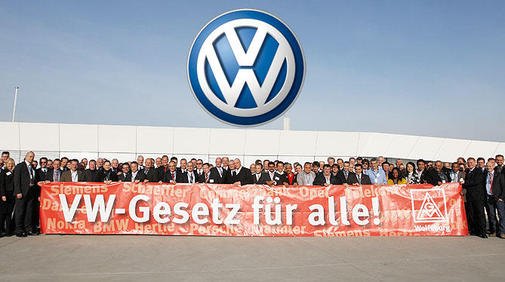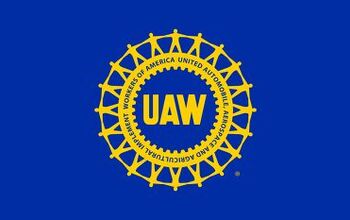Guest Post: Jamie Kitman On The Battle Of Chattanooga
TTAC welcomes Jamie Kitman, of Automobile Magazine, NPR’s CarTalk and other international outlets, as he presents his analysis of what went wrong at Chattanooga, and the next steps for the labor movement’s efforts in the auto industry.
With all the clamorous back patting and joyous trills of laughter attending the defeat of the UAW’s unionization drive at Volkswagen’s plant in Chattanooga, one has that nagging sensation, increasingly common these days that the whole 20th century never happened.
I am not here to defend everything that has ever been done in the name of the United Auto Workers or any other union, because their list of wrongdoings is long. There has been corruption, laziness and greed, none of which I, or most union members, for that matter, would endorse. But the list of mean, corrupt and otherwise heinous acts committed by manufacturers through the years in the name of unfettered profit is undoubtedly greater. Profits are swell and all that, but the business of manufacturing is most beneficial to communities and society as a whole when all stakeholders have a seat at the table.
Anyone who can remember or has read of the days when a worker without a college education could support a family, buy a house, go on vacation, put three kids through braces and college, ought to think about the good unions have done. Ironically, many who lament the passing of middle class prosperity oppose one of the main instrument s of its creation.
Now there are those whose official position is to go blindly on the side of organized capital, no matter the cost, including apparently enough Republican politicians in Tennessee to fill a basketball arena, and that is their right. Less certain is whether terrifying workers about the parade of horribles that might ensue from a vote to certify the union – based on conversations they claim to have had with VW management – will withstand legal muster; if VW had told workers they’d close down a line on account of a pro-union vote, they’d be in violation of the law. If local politicians with their television pulpits were knowingly doing the company’s bidding, the law may well have been broken, too.
Then again, these are the same politicians who tell their constituents that climate change is a myth, that President Obama is a communist traitor and demand that their children be taught in public schools that the world was formed over a mere 144 hours, 6000 years ago. The people keep electing them, so maybe the non-union South is simply getting what it’s paid for.
What rankles are those who claim to be looking out for working men and women and oppose unions anyway as bad for labor. Where is their proof? That the American auto industry went wrong after 100 years on top? Er, actually, the years of the industry’s greatest prosperity coincided with the years of the UAW’s greatest prominence.
What rankles still more are the so-called journalists covering this story as if somehow the future of capitalism depended on their penning love letters to management. They seem to have forgotten that there were good and honest reasons for autoworkers to unionize in the 1930s. That there were reasons employees tithed a portion of their weekly wage packets to the union, and reasons that laws were enacted to protect the right of workers to organize for the purpose of collective bargaining. And there were reasons that, yes, car companies, like Volkswagen, grew to value their union relationships.
Well, folks, those reasons didn’t all go away. Do you honestly believe that no one at any of the southern car factories wants to be in a union? Would that be because life on the shop floor has gotten so pleasant and they feel like they’re getting paid so much and that their work rules and grievance procedures are now so fair that they have no complaints? If so, ladies and gentlemen of the Fourth Estate, why aren’t you actually reporting that story on the ground, rather than inferring it from the lack of successful union drives in the South? Or perhaps you might have to start reporting the story of how Nissan and other U.S. transplants spy on and thuggishly seek to disrupt the would-be organizers in their midst, as anti-union managements have always done. That is, of course, how unions were kept down in their early days, all across America, all across the world. Other times, when their movements started becoming too successful, workers were killed for their union activity.
But let’s ignore that part of the ugly history and stay in the moment. Assaying the wholesale death of middle-class factory jobs in this increasingly non-union country, the value of union associations to workers seems kind of obvious. And now as union membership dwindles, we see more auto industry jobs that don’t pay enough for people to even approximate what was known for more than half a century as a decent, middle class life. Instead, we increasingly see workers hired in the non-union, transplant carmakers – Nissan, Hyundai, Toyota, BMW and Honda—not only as non-union employees, but as temporary workers, with few if any benefits to go with their new, lower wages. The auto industry is not alone here, but without a viable middle class, one must wonder who exactly is going to be buying all those cars and trucks our factories can make. If people had more money, maybe they wouldn’t need 80-month loans and all that cash back.
Low wages aren’t as bad as no wages because you have no job, it’s true, but they’re not as nice as good wages and that’s not the choice, anyway. Commentators and pundits lashed out at Henry Ford for paying his workers a living $5 a day wage when half that was the national standard but the move, if anything, helped his company. And the unionized American industry proved for much of the 20th century that you could have both jobs and good wages, with the German automobile industry out there still, continuing to prove the same thing. Not too unsuccessful a manufacturing economy last time I looked, Germany pays its autoworkers the world’s highest industrial wages. And indeed Volkswagen’s 61 other factories outside the US are union shops, excluding China.
So what’s that I hear, Sen. Corker? You think the deal the Chinese workers get is good enough for the hardworking people of Tennessee?
Evidently. For those who weren’t paying attention, the senator was so exorcised by the fact that a UAW preliminary card count showing a majority of workers at Chattanooga supporting the union, that he publicly told VW workers that the SUV the company was saying it might build in Tennessee would go elsewhere if the union was certified.
“I’ve had conversations today and based on those am assured that should the workers vote against the UAW, Volkswagen will announce in the coming weeks that it will manufacture its new mid-size SUV here in Chattanooga,” Corker announced, ominously. Of course, his statement also admits of the possibility that they might have also said they’d build it either way, but clearly that was not the impression he meant to give.
And what Volkswagen was thinking isn’t exactly clear, either. Their union at home in Germany is very powerful, but that doesn’t mean they like it.
Of course, Volkswagen Chattanooga’s chairman and CEO Frank Fischer dismissed any linkage between the vote and the decision to build the new SUV in Chattanooga . But there is good reason to believe Corker’s scare tactic was enough to scuttle the UAW’s drive; just 44 additional people would have had to vote in favor of union affiliation for it to have prevailed.
There’s also ample reason for VW’s Chattanooga work force to question the overall sincerity of its employers, which already reneged on a pledge to build Audis there, so long as the launches of the Jetta and New Beetle (built in Mexico) were successful, which they claimed were. So who knows what the truth of VW’s involvement is?
If they really wanted the UAW in place so as to be able to set up their works council, surely they could have countered Corker’s intemperate remarks. Or perhaps they have another way around U.S. labor laws. Who knows?
What we do know is that the company certainly knows how to sweet talk Tennessee politicians, having received the most generous state grant of any American corporation looking to set up shop anywhere ever – a package that included $577 million in tax breaks, over $40 million in training assistance and over 1,500 acres of land, gratis. All for 1,550 jobs, in a city which can’t afford to update a sewage system that is 100 years out of date, causing the town to reek many days of the year. That’s close to half a million dollars per job.
The really upside down part is that Detroit still pays union wages to some of its employees. So actions like Corker’s are in essence a gift to big conglomerates from Japan, Germany and Korea when they come to America. Until, that is, the moment when the low wages paid in transplant factories fully kill decent wages for the home team. At which point they will have sown the seeds for a union fight as ugly as any ever seen.
Because the harder the workers get stomped on, the sooner and clearer the need for unions will be. Because left to its own devices, big money always races to the bottom. It is the nature of the beast.
So the battle of Chattanooga may be lost. But the larger war is hardly over.
More by Jamie Kitman
Latest Car Reviews
Read moreLatest Product Reviews
Read moreRecent Comments
- Calrson Fan Jeff - Agree with what you said. I think currently an EV pick-up could work in a commercial/fleet application. As someone on this site stated, w/current tech. battery vehicles just do not scale well. EBFlex - No one wanted to hate the Cyber Truck more than me but I can't ignore all the new technology and innovative thinking that went into it. There is a lot I like about it. GM, Ford & Ram should incorporate some it's design cues into their ICE trucks.
- Michael S6 Very confusing if the move is permanent or temporary.
- Jrhurren Worked in Detroit 18 years, live 20 minutes away. Ren Cen is a gem, but a very terrible design inside. I’m surprised GM stuck it out as long as they did there.
- Carson D I thought that this was going to be a comparison of BFGoodrich's different truck tires.
- Tassos Jong-iL North Korea is saving pokemon cards and amibos to buy GM in 10 years, we hope.


































Comments
Join the conversation
"Because the harder the workers get stomped on, the sooner and clearer the need for unions will be. Because left to its own devices, big money always races to the bottom. It is the nature of the beast." The fallacy in this argument is that the primary mission of the UAW is to help its members. That's certainly up for debate and has been for a long time. The major unions became a huge target when they decided that they were going to be the fundraising and activist arm of the Democratic party. Tennessee voted nearly 60% Republican in the last Presidential election. When you get into something as contentious as politics and funnel ~95% of the dues money that is (in most cases) involuntarily withheld from worker's paychecks to one party (the opposing party in this case), why is it surprising when the UAW faces so much opposition? For the record, I think the idea of a works council is a good idea. I think that giving workers a seat at the table and being invested in the success of the company is a benefit to them and the organization. But the UAW's reputation precedes themselves. Besides the politics, it was only a matter of time before a contentious relationship between the UAW and VW developed. It's in their DNA. Southerners are not stupid. Remove the UAW from the campaign for a works council and I bet it passes easily. Better yet, change the antiquated labor laws in this country to allow the workers to form a council on their own. I agree that workers need protection, but forced unionization and everything that goes along with that is not the only way to attain it.
Well at least the comments were a little more sane than i was expecting.